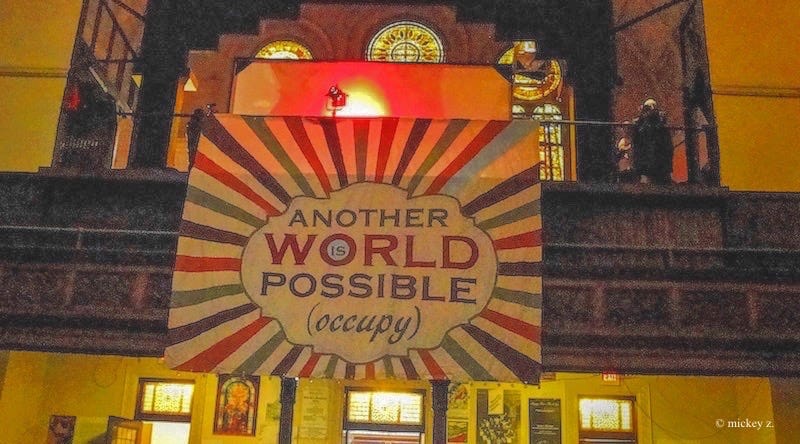Within the realm of activism, “corporate” is a dirty word.
Don’t get me wrong, corporations have done their damnedest to earn such vitriol and malice. It would take several volumes for me to even attempt to document this catalog of criminality.
But let’s keep things simple by summing up: Corporate power is, directly and indirectly, responsible for poisoning and destroying the natural world while simultaneously reinforcing cultural dynamics that lead to perpetual oppression, violence, illness, and poverty across the globe.
The sins of Corporate America are no secret. People write books about them, make movies about them, create podcasts about them, hold signs “protesting” them, and file lawsuits related to them. Corporate malfeasance is so normalized that it is regularly parodied in popular culture (thus creating more corporate profits).
Countless “movements” — most notably Occupy Wall Street — have sprung up to allegedly address this planetary crime spree. By relying on the same old failed tactics, these protests accomplish nothing more than a tsunami of social media posts (thus creating more corporate profits).
I’d like to share something I’ve witnessed over and over, through direct experience. A global event happens. It could be anything from an election to a police shooting to an environmental disaster or war crime… whatever.
This event enrages a portion of the population. Some of those enraged folks feel a strong need to express their ire but wind up attending disorganized, futile gatherings called “protests.”
At these gatherings, long-existing activist groups show up to sell their newspapers and hand out flyers about their next meeting. This propaganda lures in some of the recently activated dissidents and thus guarantees that nothing new will be tried and zero progress will be made.
It’s almost as if some “activists” are more concerned with gaining followers than garnering results (insert rimshot here).
My question: Why can’t activists choose to instead learn from winners?
In every other venture in life, we look for positive role models. We seek out proven archetypes. We aim to find the clues left behind by the architects of thriving efforts. As much as you may justifiably despise what corporations have done to our society, surely you can recognize the value of dissecting their blueprint.
Corporations will brazenly co-opt ideas from even their most venomous enemies. They’ll sanitize those concepts and sell them right back to their hapless enemies as commodities. Why can’t this process be reversed? Why can’t activist movements co-opt proven corporate tactics to attain their diametrically-opposed goals?
By de-occupying black-and-white thinking, we can acknowledge the consistently winning record of Corporate America. Rather than demonizing and rejecting, we can figure out how that particular kind of culture continues to thrive and expand. There is no need to reinvent the wheel when industries all over the world have already created a tried-and-true template for progress.
For starters, I submit these 20 basic but essential questions the resourceful folks of Corporate America often ask before they embark on a new project:
What are the objectives?
How do you define success?
If the project doesn't succeed, what are the implications?
Why is this project so important?
What are the most important dates?
What are the most important decisions that need to be made?
What will prevent us from making those decisions?
What are the biggest obstacles to getting this done?
Who influences but doesn't own?
Who has the potential to be an obstacle?
What are the project's greatest assets?
How can we best leverage those assets?
What are the most important areas we should always focus on?
How much risk are you willing to take to accomplish this?
What barriers have you encountered in the past about this issue?
What keeps you up at night about this?
What topics haven't we discussed?
What topics would you rather not discuss?
What is your personal passion for this project?
What will this mean to you when we succeed?
Here are some follow-up questions of my own, directed at activists:
Have you ever heard even one of the above questions honestly asked within your circles?
What kind of reaction would you get if you proposed such questions?
Have you ever attained any long-term success with your actions?
What are you willing to do right now to make sustainable progress toward your goals?
Are you ready to surrender the purity litmus tests so you can learn how to win — even from those with whom you strongly disagree?
Yes, I know, positive results are easier to find when you get billions of dollars in corporate welfare. But it still requires a blend of quarter-to-quarter planning with a long-term vision to maintain steady outcomes — even within the realm of predatory capitalism.
There is plenty a grassroots movement can learn from studying the day-to-day workings of companies that never stop advancing and flourishing.
Let’s face it, with the almost non-existent win rate of social justice groups, isn’t it at least worth a try to appropriate something practical from the side that always comes out on top?
In the meantime…
When multinational companies ask the 20 questions above at one of their copious meetings, they are not looking to make the world a better place. Their goal is to keep their shareholders happy in the next fiscal quarter. They waste no time talking about the small but urgent steps that must be taken all day, every day, to help humans and non-humans in need. Case in point:
One of the homeless women I helped the longest (I’ll call her G) had a regular panhandling spot in midtown Manhattan — near the strip now called “billionaire’s row.” The building directly above her spot is home to many high-end businesses.
Some employees of these companies got to know G and it was not unusual for me to find one or two of them sitting — on the asphalt — beside her during their lunch breaks. They’d chat, offer help and advice, and mostly, just treat G like the human being she is.
Their employers were not pleased.
The building manager and other local building managers saw the presence of a homeless woman on “their” block as a serious threat to the value of the local real estate.
All of the companies in that building sent memos to their employees, warning them to not associate with homeless people during work hours (including lunchtime). Every single one of the employees complied. But one woman did get word to G to let her know why she had suddenly been abandoned. I can still see G’s face as she tearfully told me this story.
This is the nefarious side of corporate culture in action. We, as “activists,” can borrow winning tactics without behaving like the “enemy.” So, please allow me to introduce one more question for your next meeting:
What are you doing each day to make a difference in the world while you work to increase the effectiveness of your activism?
This query will distance you from your corporate rivals. It will show that you are not just concerned with notoriety, power, control, and profit. You are aware of the humans and non-humans in need and you are willing to prioritize helping them over your personal gain and above your social media likes and follower list.
The protest community — across the ideological spectrum — desperately needs to evolve. To achieve this goal, they can learn from winners without sharing their values. So, to all of you who see this as your time to rise up and make a difference, I offer two suggestions:
Don’t adhere to a template of failure. Find successful role models to learn from.
As you cultivate the skills and kindred spirits you’ll need to create sustainable change, remain focused on and dedicated to those vulnerable souls who need help ASAP.
Living an open-minded life of service puts you in the best position to strategize and help at the same time. If it requires learning a lesson or two from Corporate America, so be it.







That's the thing, many people believe the prosperity we have is because of corporations, so protesting them is near useless if you don't provide people with a vision of how their prosperity would be better without corporations. I personally think corporations are now making the average American less prosperous, but that means nothing if I cannot somehow show people there is a better alternative.
That would require building alternative markets and mutual aid societies, but that tends to be more a function of necessity than desire, and Americans seem to have relatively little desire to build such networks. But that may be in part because they don't know such is possible.
When Adams got fired for his righteous speech, I bought several of his books. One is losertalk, and it goes along the lines you mention here. Interesting!
As to businesses, trying to avoid Big anything, but that is not easy.